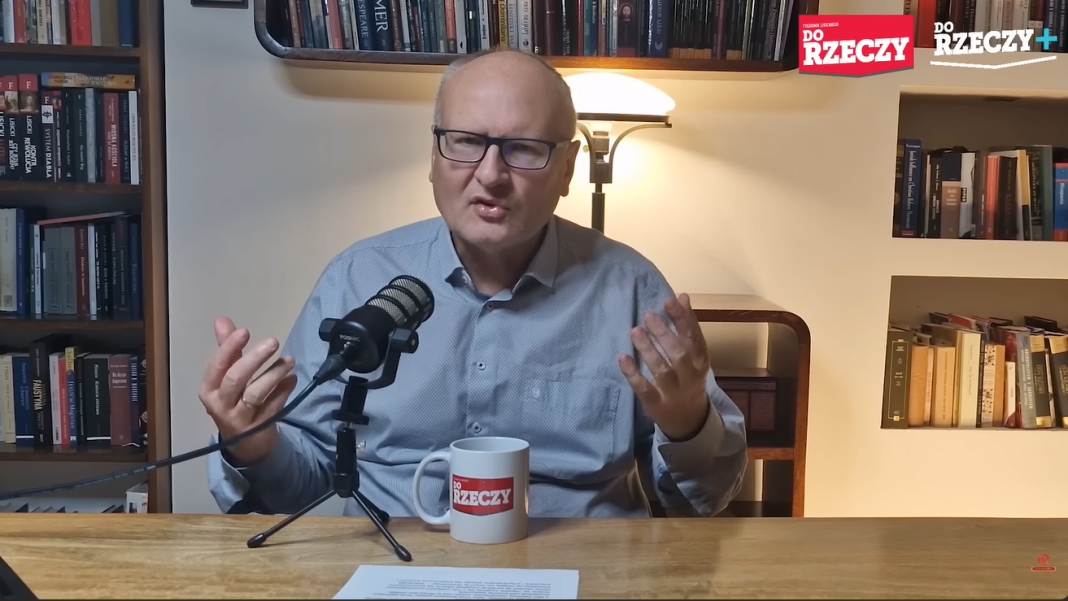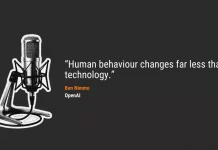In the Do Rzeczy podcasts, the editor-in-chief of this publication was surprised that numerous circles and political actors in Poland were talking about an attack on our country (in the context of drones over Poland). In the editor’s opinion, these are unfounded and unverified claims. Moreover, NATO and Mark Rutte himself did not even mention this topic. In another podcast about sabotage on the Lublin-Warsaw railway line, Paweł Lisicki again states that Russia had no motive to attack Poland.
Let’s do an experiment. Let’s forget about the introduction and read the description of the first podcast as if we didn’t know who wrote it.
The columnist is happy that support for compulsory military service is declining in Poland. Based on this, we can sketch his “ideological portrait.” Perhaps he listens to Dezerter or another anarchist band, is a vegetarian, supports the legalization of civil partnerships, and, although it is no longer possible, he probably had dreadlocks in his youth, maybe even red ones. Meanwhile, we rub our eyes in amazement. This right-wing journalist, indeed the editor-in-chief of one of the largest conservative weeklies, is happy that support for compulsory military service is declining in Poland. Where is patriotism, attachment to the land and values, where is honor and the homeland? Something has gone wrong here, but where and when?
Lisicki refers to a poll by Rzeczpospolita, according to which support has fallen from around 60% to 39%. “This poll shows something very positive. Despite the propaganda, people are not buying it, because if they were, if they believed that a) Poland is directly threatened and b) that Russia is in a state of complete decay and that joining the war can only mean success, this poll would look different.” People, therefore, did not believe the liberal regime, and this is comforting, according to the editor.
The columnist doubts the opinion that “Russia is testing Poland” because it would allegedly serve to strengthen our country, which would quickly draw conclusions and prepare even faster for similar attacks. “This is the first time I’ve heard of one country testing another in this way,” he begins his argument. Somewhere along the line, he fails to mention the violation of Finland’s airspace for over a decade, provocative flights over NATO warships, hacker attacks on Estonia and other Western countries, support for separatism, and Belarusian attacks on Lithuania and Poland using emigrants. However, since Russia (and Belarus) have no motive, it is a waste of time to mention these activities. They are probably irrelevant.
On the other hand, the liberal regime is based on fear, “because only fear of Russia makes people turn a blind eye to obvious examples of lawbreaking. Everyone supports the government, because how can you not support the government when we are about to be attacked?” In conclusion, the editor-in-chief of Do Rzeczy believes that talking about the Russian threat only serves to divert attention from domestic political problems, and therefore no such threat exists.
A few weeks later, after the sabotage on the Polish railways, Lisicki asked again in another podcast, “What would be the goal of the Russian secret services?” The answer is: “To cause confusion and chaos in Poland. To tell the truth, this chaos, or confusion, or political division has existed in Poland for a long time and no additional external action is needed.” Lisicki goes on to say that the previous incident with the drones strengthened the government in Poland, thus causing an effect that was not convenient for Russia. The columnist adds that Russia wanted to keep other countries away from the war in Ukraine, to limit the level of involvement of Western countries. Generally speaking, if Russia were the perpetrator, it would be acting to its own disadvantage. Besides, there is already chaos in Poland, so it is a waste of effort to target Poles; this energy can be used elsewhere.
Lisicki, however, finds a party that would benefit from this diversion: “The idea was to stir up public opinion in order to provide an argument saying, look, you have no other choice, you have to go to war, you have to get more involved, you have to help us.” The scenario would be textbook in such a situation: “A situation in which a false flag operation is organized, i.e., someone causes a diversion but shifts the blame to the other side, is very likely,” concludes the editor, “In this case, I see a clear motive.”
The podcast also suggests that, knowing Radosław Sikorski’s psychological profile, it was easy to provoke the minister into escalating the situation. Lisicki does not stop there. The second suggestion concerns the corruption scandal in Kiev, which has damaged the Ukrainian government’s reputation. A Ukrainian provocation against Poland would affect its chances of receiving further support – launching this type of operation fits in with this story.
“While I don’t see any direct benefits that Russia could gain, I do see such benefits for the government in Kiev.” Lisicki does not pass judgment on this matter, but clearly suggests Ukraine’s involvement in two podcasts. He also suggests that the information about the GRU connections found by the services is questionable because conclusions were drawn too quickly.
The podcasts describe and place the events in the context of the political struggle in Poland: “One gets the impression that the Polish authorities jumped on this information in order to capitalize on it politically” (which is not the subject of this text) and, at the same time, they are promoting a counter-argument to Russian involvement, exaggerating the arguments against Ukraine and disregarding the entire context of Poland’s difficult relationship with Russia.
The viewer is left with the impression that Russia really had no motive. This fits in with the Russian narrative. There are many threats lurking, and Russia (if at all) is the least of them. We can then rejoice that society does not want compulsory military service because the “liberal regime” is scaring us with Russia. Something is not right here. But where and when? Since when has a conservative weekly magazine been guarding the narrative threads of Poland’s greatest enemy?
The quotes come from the YouTube channel Tygodnik DoRzeczy from Paweł Lisiecki’s columns. Photo: Paweł Lisicki. Screenshot from the YT channel Tygodnik DoRzeczy.
Albert Iwański





